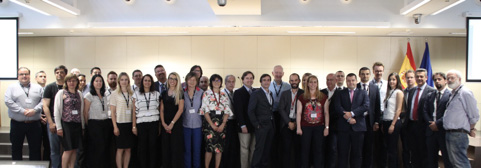Prepared by Trilateral Research on behalf of the COPKIT consortium
While organised crime and terrorist (OCT) groups are often at the forefront of technological innovation for planning, executing and concealing their criminal activities, law enforcement agencies (LEAs) lag behind when tackling criminal activities. Within this “cat and mouse” scenario, the use of new information and communication technologies by OCT groups, or criminals is a key challenge for policy-makers and LEAs due to the complexity of the phenomenon, the quantity of factors and actors involved, and the great set of criminal technological activities used to finance and support criminal and terrorist actions. “Technological development is the great game changer of our present and future. Anticipation is the way forward for LEAs to change the situation from lagging behind innovation in criminal behaviour to being ahead of the curve,” says Raquel Pastor, Senior Consultant at Ingeniería de Sistemas para la Defensa de España (ISDEFE) and co-ordinator of the COPKIT project.
On 20-21 June 2018, researchers from 16 different organisations (from law enforcement, academia, industry, legal, ethics and privacy committees) in 13 European countries met in Madrid to launch the EU-funded COPKIT project which aims to create an intelligence and knowledge ecosystem for LEAs, in order to support prevention, investigation and mitigation in the context of the fight against OCT organisations. The two-day event was attended by 40 people who spent the first day of the meeting reviewing the objectives and structure of the project, including management, internal procedures, external advisory boards and LEAs’ involvement. The first day was also dedicated to ethics, privacy and data protection, as well as to the plans for dissemination, exploitation and communication of COPKIT results. The partners addressed the specific tasks and approaches of each of the work packages on the second day of the event.
The COPKIT project focuses on the problem of analysing, preventing, investigating and mitigating the use of new information and communication technologies by organised crime and terrorist groups. This question is a key challenge for policy-makers and LEAs due to the complexity of the phenomenon, the quantity of factors and actors involved, and the great set of criminal and terrorist technological activities in support of OC and terrorist actions. EUROPOL, the European Policy Agency, is the head of COPKIT’s Advisory Board. In its Serious and Organised Crime Threat Assessment (SOCTA) report (“Crime in the Age of Technology”) last year, EUROPOL said that “This is now, perhaps, the greatest challenge facing LEAs around the world.”
“To be able to act earlier, earlier and better knowledge and intelligence are required. That’s why we will develop a toolkit supporting the Early Warning (EW)/Early Action (EA) methodology and enabling LEAs to stay ahead of the curve of new developments in the use of technology by organised crime and terrorism groups,” says Ms Pastor. EW explains how crimes are evolving, identifying “weak signals”, warnings, new trends, and forms a basis for assisting decision-makers, at both strategic and operational levels, in order to develop EA (preparedness, mitigation, prevention and other security policies). With the involvement of technical, academic (criminology) and LEA partners from various EU countries, the COPKIT project will adopt the EW/EA methodology and the required technical support to make the approach implementable by LEAs.

Image credits: COPKIT Consortium
About COPKIT
The COPKIT project – Technology, training and knowledge for Early-Warning/Early-Action led policing in fighting Organised Crime and Terrorism – has received grant agreement No 786687 under the European Union’s H2020 research and innovation programme. COPKIT will focus on several aspects: (1) developing and applying an EW/EA system and applying it to use-cases, (2) developing a toolkit for knowledge production and exploitation, tested by LEAs in their premises, (3) ensuring respect of EU legal and ethical principles, (4) developing innovative curricula for all aspects of the EW/EA methodology and eco-system to facilitate the uptake by LEAs.
Meet the team
COPKIT is co-ordinated by Raquel Pastor, Ingeniería de Sistemas para la Defensa de España (ISDEFE), Spain. Its partners include Thales Nederland BV (Netherlands), IBM Ireland Limited (Ireland), Trilateral Research LTD (United Kingdom), Legind Technologies AS (Denmark), Universidad De Granada (Spain), Kentro Meleton Asfaleias (Greece), Law and Internet Foundation (Bulgaria), AIT Austrian Institute of Technology GMBH, (Austria), Ministerio Del Interior (Spain), Hochschule Fur Den Offentlichen Dienst In Bayern (Germany), Inspectoratul General al Politiei Romane (Romania), Glavna Direktsia Borba S Organiziranata Prestupnost, (Bulgaria), Iekslietu Ministrijas Valsts Policija Sta Te Police Of The Ministry Of Interior (Latvia), Ministere De L’interieur (France), Police Federale Belge (Belgium).

